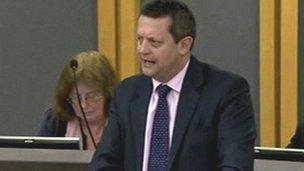Horsemeat allegations 'misleading', says Farmbox Meats lawyer
- Published
Dafydd Raw-Rees said he felt "picked on"
A meat firm raided as part of an investigation into the horsemeat scandal is the victim of "misleading" allegations, says its lawyer.
Farmbox Meats Ltd, of Llandre near Aberystwyth, was one of two places visited by Food Standards Agency (FSA) officials on Tuesday afternoon.
The FSA seized meat and paperwork from the site.
Aled Owen, a solicitor acting for the firm and its director Dafydd Raw-Rees, said his client denied any wrongdoing.
The FSA said it had suspended operations at both Farmbox Meats and a slaughterhouse in Todmorden, West Yorkshire.
The slaughterhouse is thought to have supplied horse carcasses to the Aberystwyth firm, which were then allegedly sold on as beef for kebabs and burgers.
However, Mr Owen said the meat currently on site at Farmbox Meats was all linked to the Republic of Ireland and to its eventual destination in Belgium.
"As to the gentleman in Yorkshire, there has been a small window of contact a long time ago, before this year, and that was only for the purchase of 15 cows," he said.
"There's not been any contact this year - it was towards the end of last year and that's the complete contact there has been in that respect.
"The contact was also not for any horsemeat - the order was for cattle."
Mr Owen said he had no idea where the allegation regarding horsemeat in kebabs and burgers had come from.
"The issue about kebabs and burgers is something not within my client's knowledge, not within the information provided to us and is based on comments stated by a senior officer within the FSA which at the moment are unfounded and unclear.

Farmbox Meats near Aberystwyth was one of the premises raided
Mr Raw-Rees said the firm was licensed to deal with horses and had been cutting horsemeat from the Republic of Ireland for export to Belgium over the last three weeks.
"I get paid to do the cutting up. We don't do kebabs, mincemeat or beef burgers. This is not a processing plant," he said.
Meanwhile Wales' Deputy Minister for Agriculture Alun Davies said both the Welsh government and the UK Department for Environment, Food and Rural Affairs (Defra) were supporting the FSA and the police in their inquiries.
He added that safeguards were in place in the food processing system to ensure that Welsh beef reached the highest standards of quality.
"We want to ensure that everybody can have confidence in the food we buy and the food we eat," he said.
"If you look at Welsh beef, it has a particular European designation that means all of the processing plants, the slaughterhouses, the retailers, understand that it has to meet extremely high standards.

Alun Davies said procedures were in place to guarantee the quality of Welsh beef products
"I hope that consumers will continue to support the Welsh red meat sector, and will have confidence in the systems we have in place to ensure that when we have Welsh beef products, we're enjoying meat of the highest quality."
The horsemeat scandal began last month when Irish authorities discovered horsemeat in some burgers stocked by a number of UK supermarket chains.
Horsemeat has also been found in branded and supermarket-own ready meals, including lasagne and spaghetti bolognese, in some cases accounting for up to 100% of the meat content.
The crisis has spread across Europe as details of the convoluted supply chain in the meat industry emerged.
The FSA in the UK has ordered food businesses to carry out tests on all processed beef products and the first results are expected on Friday. They are testing for the presence of horsemeat and pork.